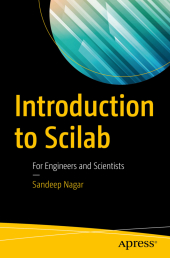 Neuerscheinungen 2017Stand: 2020-02-01 |
Schnellsuche
ISBN/Stichwort/Autor
|
Herderstraße 10
10625 Berlin
Tel.: 030 315 714 16
Fax 030 315 714 14
info@buchspektrum.de |

Sandeep Nagar
Introduction to Scilab
For Engineers and Scientists
1st ed. 2017. xv, 193 S. 8 SW-Abb., 38 Farbabb. 235 mm
Verlag/Jahr: SPRINGER, BERLIN; APRESS 2017
ISBN: 1-484-23191-0 (1484231910)
Neue ISBN: 978-1-484-23191-3 (9781484231913)
Preis und Lieferzeit: Bitte klicken
Familiarize yourself with Scilab using this concise, practical tutorial that is focused on writing code to learn concepts. Starting from the basics, this book covers array-based computing, plotting, and working with files in Scilab. Introduction to Scilab is useful for industry engineers, researchers, and students who are looking for open-source solutions for numerical computation.
In this book you will learn by doing, avoiding technical jargon, which makes the concepts easy to learn. First you´ll see how to run basic calculations, absorbing technical complexities incrementally as you progress toward advanced topics. Throughout, the language is kept simple to ensure that readers at all levels can grasp the concepts. After reading this book, you will come away with sample code that can be re-purposed and applied to your own projects using Scilab.
What You´ll Learn
Apply sample code to your engineering or science problems
Work with Scilab arrays, functions, and loops
Use Scilab´s plotting functions for data visualization
Solve numerical computing and computational engineering problems with Scilab
Who This Book Is For
Engineers, scientists, researchers, and students who are new to Scilab. Some prior programming experience would be helpful but not required.
1. Introduction to Scilab. 2. Working with Scilab 3. Working with Arrays 4. Plotting 5. Data Through File Reading and Writing 6. Functions and Loops 7. Numerical Computing Formalism 8. XCOS
Sandeep Nagar, Ph.D. teaches and consults on the use of Octave, MATLAB and other open source programming languages for for data science/analysis and numerical computing for engineering and science applications. In addition to teaching at universities, he frequently gives workshops covering open source software. Sandeep has a Ph.D. in Material Science from KTH, Sweden in May 2012. Prior to that degree, he obtained a M.Sc. in Physics with specialization in Electronics and Radio Physics and a B.Sc.B.Ed degrees in India.


